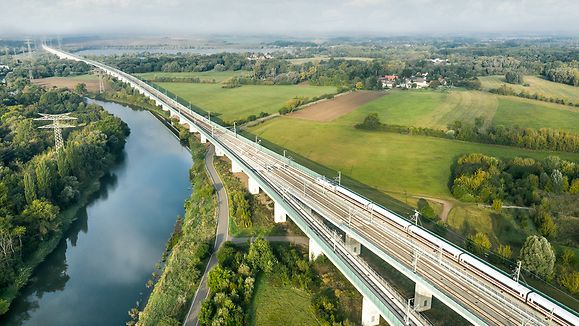News from the Regions in Structural Change | June 2025
Germany’s regions in structural change are attracting significant new investments in diverse sectors. Here we provide a brief look at recent major investments and developments in the forward-looking region.
Jun 13, 2025
- Japan’s Nissha Group Invests EUR 20 Million in Thuringia Expansion
- Feralpi Steel Inaugurates EUR 220 Million Steel Plant in Riesa
- Skeleton Technologies Invests EUR 42 Million in Bitterfeld-Wolfen Chemical Park
- Fraunhofer Develops Drone for Safe Land Mine Disposal
- Female Start-up Report in Eastern Germany
- Additive Drives Takes Start-up Prize at German Innovation Awards 2025
- TU Freiberg Develops New Alu Battery
- Dresden and Halle Researchers Discover 2D Molecule That Conducts Electricity
Japan’s Nissha Group Invests EUR 20 Million in Thuringia Expansion
Japan’s Nissha Group has invested EUR 20 million in a new production hall at its manufacturing site in Waltershausen, Thuringia. The specialized manufacturer of sophisticated plastic parts, which is now producing films for the front end of electric vehicles, also received around EUR 1.8 million in federal and state funding for the site expansion. The wholly owned subsidiary of Kyoto-based Nissha Co. Ltd. produces an array of products including panels for air-conditioning units, displays and buttons for automotive control units and packaging for the pharmaceutical, food and cosmetics industries.
Feralpi Steel Inaugurates EUR 220 Million Steel Plant in Riesa
Feralpi Steel has made the largest investment in the Italian company’s history in Germany with the inauguration of a EUR 220 million rolling mill in Riesa, Saxony. One of Europe’s leading steel manufacturers, the company’s new rolling mill is the first with a K-spooler in Germany and the very first to produce 8-t spooled coils in the world. The rolling mill is the first in the country with zero Scope 1 emissions, allowing steel to be produced with reduced impact on the climate. One hundred new jobs will be created at the facility in Saxony.
Skeleton Technologies Invests EUR 42 Million in Bitterfeld-Wolfen Chemical Park
Skeleton Technologies Group is investing EUR 42 million in the world’s first industrial curved graphene production facility to be located in the Bitterfeld-Wolfen Chemical Park. The German subsidiary Skeleton Materials will specialize in the development and production of curved graphene – a novel synthetic carbide-based carbon material used to enhance the energy density of supercapacitators. The new material enables significantly more powerful energy storage and is more environmentally friendly than conventional graphite which is currently almost exclusively sourced from Chinese refineries. The Federal State of Saxony is supporting the construction of the landmark facility with EUR 18.3 million in funding.
Fraunhofer Develops Drone for Safe Land Mine Disposal
The Fraunhofer Institute for Factory Operation and Automation (IFF) in Magdeburg has developed an innovative drone solution that can safely and quickly identify unexploded landmines and ordinance. Working with research and industry partners, the research establishment has created a solution that marries high-resolution sensor data with autonomous aircraft. Two system configurations – a basic “AutoDrone system” and “AutoDrone swarm system” – allow individual or swarm drone flight missions to be carried out with high accuracy even over uneven terrain. The system can also be deployed as a mobile sensor platform for other uses including geophysical surveys that require precise sensor data acquisition at low altitude.
Female Start-up Report in Eastern Germany
Female start-up founders in eastern Germany are comparatively successful despite structural disadvantages of access to venture capital and a gender investment gap according to a representative study of 400 female start-ups conducted by the Digital Hub Initiative. The study, conducted by the Institute for Innovation and Technology (iit) at VDI/VDE Innovation + Technik GmbH on behalf of the Federal Ministry for Economic Affairs and Climate Protection, finds that less than 18 percent of the approximately 1,700 start-ups in eastern Germany were founded by women, with 62 percent of female founders resorting to “bootstrapping” funding to overcome structural investment disadvantages experienced by women. One surprising corollary of this however is the fact that female start-ups enjoy more independence from investors and banks and are typically more crisis-resistant than their financed male counterparts. Nine out of ten female start-ups combine business and social responsibility objectives, with a 60 percent success rate putting them amongst the best start-up performers. Around 50 percent of female founders consider themselves to be well connected within their regional start-up ecosystems but want more coordination and cooperation between the federal states and their respective start-up support and funding programs.
Additive Drives Takes Start-up Prize at German Innovation Awards 2025
Additive Drives walked away with the start-up prize for the development of innovative, efficient and powerful electric motors using 3D printing at this year’s German Innovation Awards. The prize is awarded annually on the initiative of Wirtschaftswoche, Handelsblatt, O2 Telefonica, and Accenture. Using additive manufacturing technologies, Additive Drives is able to create individual electric motor solutions that make electric motors simpler, more efficient and cheaper. Electric motors are taken to a new level with up to 45 percent higher power density and 70 percent less losses according to the company.
TU Freiberg Develops New Alu Battery
A research team at TU Bergakademie Freiberg has made significant progress in the development of an aluminum battery that is cost effective, sustainable and can be produced by materials that are readily available and recyclable. The battery consists of aluminum as the anode, graphite as the cathode and a new type of polymer-based electrolyte developed at the university. Validation of the battery prototype for serial production will be funded by the Saxon Ministry of Economic Affairs and the European Regional Development Fund until the end of next year. The first prototype made up of a stack of 10 cells should be able to store around one watt hour of energy, with storage capacity of 10 kWh the stated objective of the research work. Application scenarios include use as a stationary power-storage system with particular relevance for private photovoltaic implementations. The use of a solid electrolyte means that the battery cannot leak, is resistant to moisture and oxygen and can significantly reduce corrosion. By replacing the conventional separate layer, the battery is also safer and cheaper to produce. Reliable results on the utilization of the innovative prototype are foreseen by the end of the year.
Dresden and Halle Researchers Discover 2D Molecule That Conducts Electricity
An international team of researchers, including TU Dresden chemistry professor Thomas Heine and 2D molecule expert Xinliang Feng from the Center for Advancing Electronics Dresden (cfaed), have developed a 2D polymer that conducts electricity as efficiently as metal. According to the researchers, the development represents a fundamental breakthrough in polymer research as it opens new possibilities for organic electronics and electrolyzers with applications in electronics, electromagnetic shielding, and sensor technology as well as electrode use in hydrogen production. A two-dimensional polyaniline molecule that forms a pure interconnected sheet conducts electrical current along molecular pathways in all directions. The development was a collaborative effort involving TU Dresden, cfaed, the Helmholtz Center "Casus" in Görlitz, the Max Planck Institute for Microstructure Physics (MPI-MSP) in Halle, and additional partners from Germany, China, and Bulgaria.

